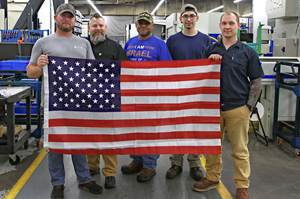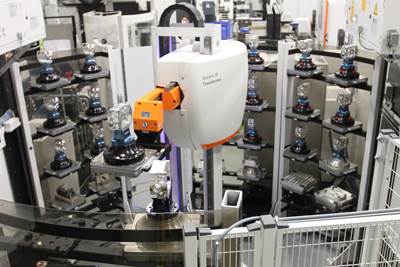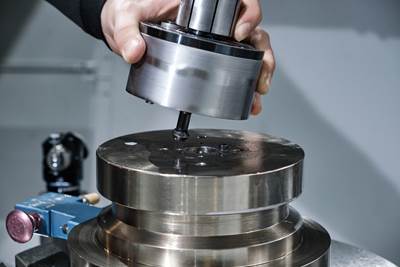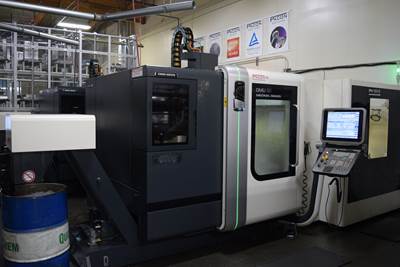Share




As the name implies, Tier One Machining and Assembly specializes in more than just machining. However, the term “assembly” does not do justice to the company’s true specialty: what leadership calls “transition sourcing,” which includes project management, inventory management, reusable custom packaging and more. As for machining, the generally newer equipment pictured in this article give a sense of shop floor processes at the company’s 60,000-square-foot plant.
However, another aspect of what differentiates Tier One is more difficult to photograph. People are at the heart of any machine shop, and when people group together, they tend to develop a shared attitude and approach to work. That is, they develop a culture.
Coming out ahead would require more than just the right kind of training and sufficient compensation. Ownership also aimed to focus on creating a top-tier experience for employees.
Tier One’s leadership contends that without the right culture, people are more likely to become disgruntled or disillusioned and seek other employment at the slightest temptation. Worse, a shop might never attract the right people in the first place — people who understand and shape processes and business strategies; who know how to invest in and use technology; and, perhaps most critically of all, add strength to the human bonds that hold any group together.

Technology and process are also critical for Tier One, hence this Mazak Palletech automation system. Two of that builder’s HC-5000 HMCs with 330-tool hives and 28 pallets ensures any one of 80 jobs can run at moment’s notice. All photos: Tier One Machining & Assembly
Culture does not show up directly in Top Shops metrics. Rather, the shop was chosen as the 2020 Honors Program Human Resources winner based on quantifiable information, such as its investments in training and employee compensation, as well as answers to questions about various human resources practices. Nonetheless, subsequent conversations with Modern Machine Shop about this data continually returned to the same subject: the importance of five governing principles in attracting and retaining the people who drive everything the company does.
The Tier One Experience
Company founders Mike Iassogna, Joe Young and Rick Hall formally codified the five pillars of what they call “The Tier One Experience” about 10 years ago. “We wanted to get ahead of the curve in succession planning and make sure we were setting ourselves up right for the future. Also, it was getting harder and harder to find the right people,” Mr. Hall explains.
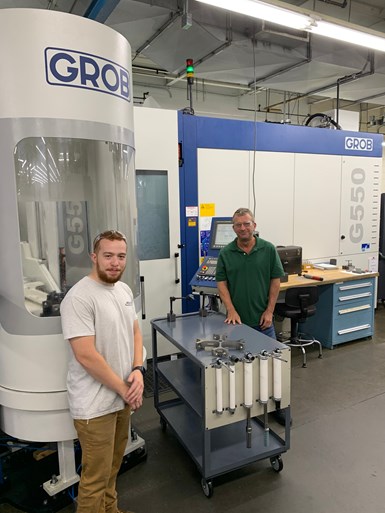
Raf (left) is a recent graduate of Tier One’s apprentice program, but calling Brian (right) a mentor and Raf a mentee is not quite accurate. “We are all mentees and we are all mentors,” says co-founder Joe Young.
Location is both an advantage and disadvantage to recruitment. Bridgeport, Danbury and other nearby locales near the company’s facility in Newtown, Connecticut are hubs of manufacturing activity, and that makes the area a natural hub of manufacturing talent, the owners say. That talent is supported through apprenticeship and workforce development programs supported by the state. Local schools are generally eager to work with state government and local shops like Tier One in promoting manufacturing careers.
However, the concentration of manufacturing firms and people makes competition for good hires fierce. Tier One’s leadership knew that coming out ahead would require more than just the right kind of training and sufficient compensation. Although both would be important, ownership also aimed to focus just as much on creating a top-tier experience for employees as creating a top-tier experience for customers.
The link between the two is implicit in one of the five pillars: “Customer peace of mind.” The owners insist that achieving this requires providing peace of mind to every individual on staff, too — peace of mind that he or she has a valuable place on the team, as does the person at the next workstation, and that even the most tedious aspects of the work serve a greater good. “Everybody is important, and what everybody does every day impacts the product and the service we provide,” Mr. Young explains.
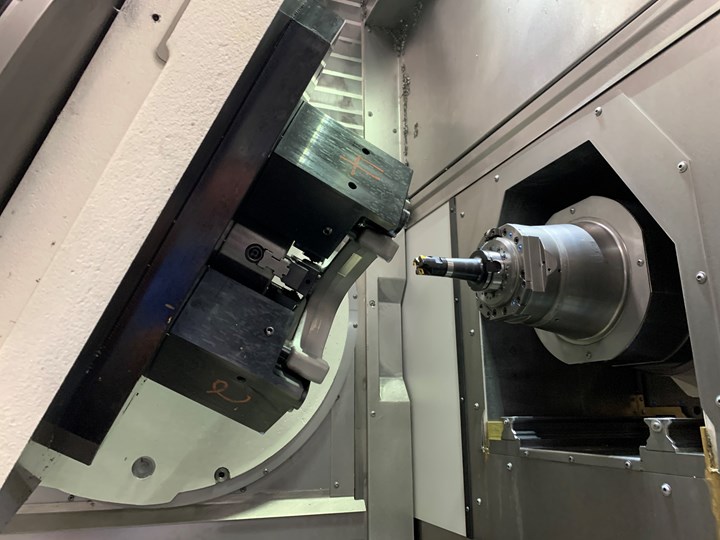
Among other design features, the five-axis Grob G550 includes a fully inverting worktable and a spindle that can retract completely from the workzone as needed.
Another of the five pillars, “Together by choice,” speaks to an appreciation for interpersonal harmony and a collective commitment to individual work ethic. “Walk the talk” means everyone should hold themselves accountable. Two more pillars, “Being the best” and “Continuous improvement,” are similar, but the former is more about growth on a personal level, while the latter is about sharing one’s ideas for improving the final product and process. “If you are doing the same thing today that you did yesterday, you are falling behind your competition,” Mr. Hall says.
For the shop owners, accountability would be measured by the extent to which the Tier One philosophy could evolve beyond mere words. “Change takes time,” Mr. Iassogna says. “Change is hard. For the first five years or so, the Tier One experience didn’t get a lot of momentum, and we’d always talk about getting rid of it, but we kept at it anyway.”
The “How” Matters, Too
Perhaps the most obvious way in which the Tier One Experience manifests itself in the day-to-day life of employees is performance reviews. Periodic evaluations focus on all the categories one might expect. However, metrics related to productivity, quality record, technical knowledge and understanding of shop practices and standards, as well as attendance, safety, and so forth, constitute only half the review. The other half consists of criteria that are more subjective, but no less important. For example, has the employee actively contributed to continuous improvement by taking initiative, or demonstrated a drive to “Be the best” by learning (or even expressing a desire to learn) something new? “How you do something is as important as what you do,” Mr. Iassogna says.
“You can tell pretty quickly who wants to push buttons all day and collect a check.” – Mike Iassogna, Tier One Machining and Assembly
The Tier One Experience has also filtered into the hiring process. As a result, employees can rest assured that others are not only held to the same high standards, but also appreciate being held to those standards. In short, everyone at Tier One is “Together by choice.” As Mr. Iassogna explains it, “We might ask what they suggested to improve at their last job. From there, we might ask how they felt about that, and how the company responded — ‘So why didn’t you push for it then, if you thought it was such a good idea?’ Or even, ‘What’s the last book you read, or the last podcast you enjoyed?’ You can tell pretty quickly who wants to push buttons all day and collect a check, and employment here is a lot more than that.”
“It might sound a little strange, but we even try to scare them with it,” Mr. Hall adds, recalling one recent case in which a job candidate left during the interview. “We want to make sure they know how serious we are about needing a good fit.”
Ingrained Opportunity
Making the Tier One Experience real has required more than revamping hiring and performance review criteria. The company has also invested heavily in training. One example is “lunch and learn” events in which the company invites suppliers to give presentations on manufacturing technology and practices. The owners cite typically high turnout of these voluntary events as evidence of the company’s governing philosophy taking hold.
Employees can also take advantage of specific software training, which the company provides by leveraging matching state grants to purchase advanced licenses. Via unlimited access to Tooling University from SME, staffers can take online training modules covering hundreds of specific topics at their leisure. “We’re not a welding shop, but maybe someone wants to learn what welding is all about — we encourage that sort of thing,” Mr. Young says.
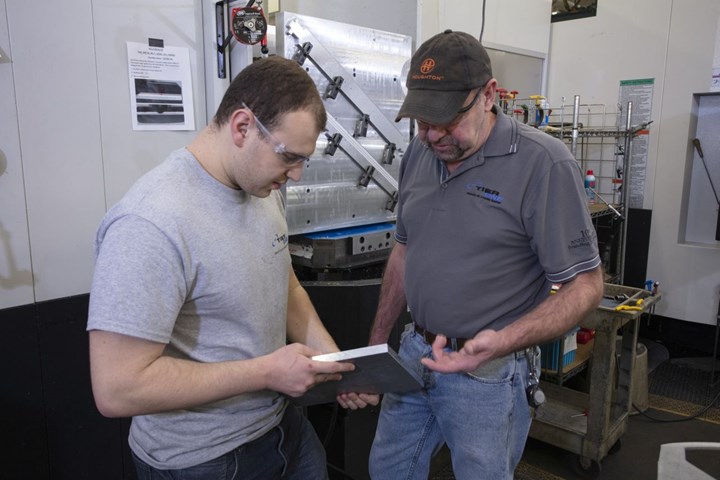
Making the Tier One Experience work requires veterans to be willing to step up and mentor newer hires as well as hiring people who are eager to learn in the first place.
Two state-certified apprenticeship programs cover CNC machine maintenance and CNC machining skills, respectively. Apprentices split time between the shop and their community colleges or local high schools. Working closely with these institutions provides a means of both attracting recruits and shaping the program by informing curriculum. Given the company’s advantageous location — three high schools nearby offer machining programs — simply participating is not enough. “We sit on the technical advisory board for all three schools, so we get to drive the program and provide feedback on what graduates do and don’t do well,” Mr. Iassogna says.
Active engagement continues on the shop floor, where apprentices rotate through multiple areas of the shop to allow them to explore their interests. In each, they are paired with a formal mentor who guides their training. Machining veterans holding themselves accountable for the education of the neophytes is considered proof that the new culture has taken hold. At one point, efforts to get veterans on board included bringing in the director of a high school technical program to help teach how to teach.
However, changing attitudes has been just as important. “We had one guy who was exceptionally grumpy and complaining about an apprentice, and we asked, ‘Well, how did you learn all this stuff?’” Mr. Young recalls. “He went on for 15 minutes about how his old mentor took him under wing. We looked at told him he needed to understand that now he’s the old guy. That’s when it clicked for him.”
Related Content
Finding Skilled Labor Through Partnerships and Benefits
To combat the skilled labor shortage, this Top Shops honoree turned to partnerships and unique benefits to attract talented workers.
Read MoreHow a Custom ERP System Drives Automation in Large-Format Machining
Part of Major Tool’s 52,000 square-foot building expansion includes the installation of this new Waldrich Coburg Taurus 30 vertical machining center.
Read MoreTop Shops: Designing a Shop to Meet Customer Needs
Working closely with customers and making careful investments has enabled this Wisconsin machine shop to tackle difficult jobs with tight deadlines as a core part of its business.
Read MoreRead Next
When Machining Lights Out Leaves Nothing Out
A Top Shops honors program winner strives to ensure every part crosses paths with a robot, cobot or pallet changer.
Read MoreMachine Shop Scale-Up Mirrors Past Success
An aerospace manufacturer doubles down on a subset of work and a knack for turning shopfloor problem solving into marketable new products.
Read MoreStandardization Leans the Way to High-Mix Automation
An increasingly digitalized, lean manufacturing process begins with a common selection of cutting tools and five-axis machining fixtures.
Read More




















.jpg;maxWidth=300;quality=90)
